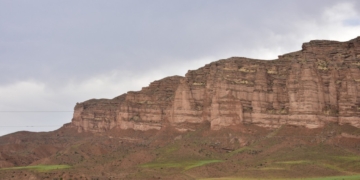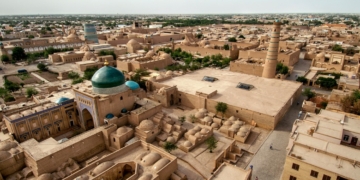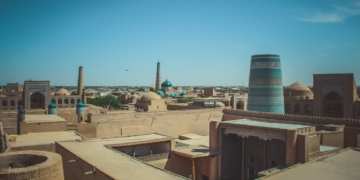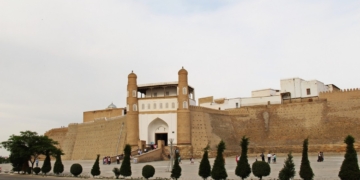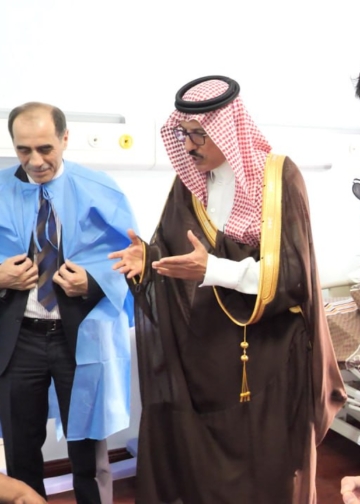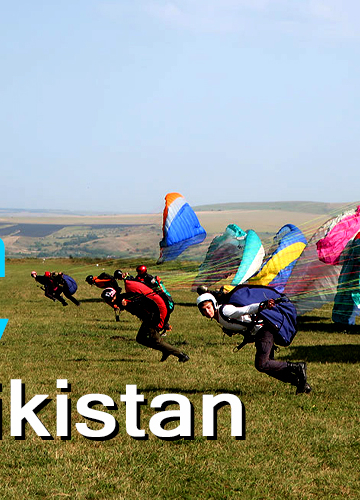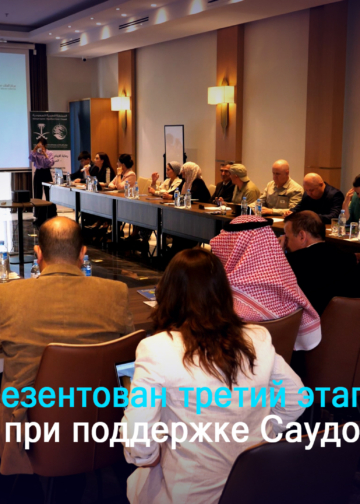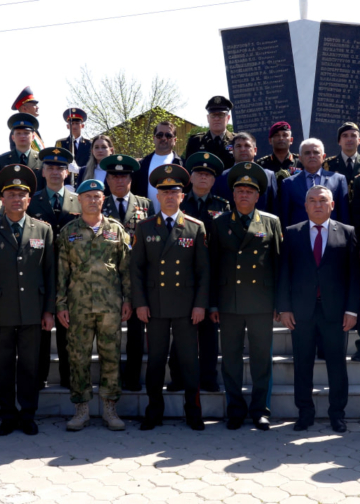id: 136089
date: 1/2/2008 11:49
refid: 08DUSHANBE2
origin: Embassy Dushanbe
classification: UNCLASSIFIED//FOR OFFICIAL USE ONLY
destination:
header:
VZCZCXYZ0003
RR RUEHWEB
DE RUEHDBU #0002/01 0021149
ZNR UUUUU ZZH
R 021149Z JAN 08
FM AMEMBASSY DUSHANBE
TO RUEHC/SECSTATE WASHDC 0061
INFO RUEHEK/AMEMBASSY BISHKEK 0003
RUEHAH/AMEMBASSY ASHGABAT 0003
RUEHTA/AMEMBASSY ASTANA 0003
RUEHNT/AMEMBASSY TASHKENT 0003
RUEHMO/AMEMBASSY MOSCOW 0003
RUEHBUL/AMEMBASSY KABUL 0009
—————— header ends —————-
UNCLAS DUSHANBE 000002
SIPDIS
SIPDIS
SENSITIVE
STATE FOR SCA/CEN
E.O. 12958: N/A
TAGS: EAID, PGOV, PREL, TI
SUBJECT: DEPUTY FOREIGN MINISTER
REQUESTS HELP TO REBUILD TAJIK
NATIONAL MEDICAL UNIVERSITY
1. (SBU) Summary: Tajik Deputy Foreign Minister Kasimov
summoned
donor country representatives December 27 to request assistance for
rebuilding the National Medical University, which had burnt to the
ground the day before. Kasimov
stated that primary responsibility
for the emergency response rests with the Tajik government, and
acknowledged that spending on lavish presidential show projects has
contributed to growing donor fatigue.
Kasimov also discussed
progress on operations at the U.S.-built Tajik-Afghan bridge and
offered advice on conducting future exchanges with the Tajik
Parliament. End summary.
National Medical University — Tajiks Request Help
——————————————— —-
2. (SBU) Electric heaters,
ancient wiring, and an alarmingly poor
response from firefighters contributed to the total destruction of
the main building of the Tajik Medical University on December 26.
One of the oldest government buildings in this relatively young
capital, the Tajik Medical University graced the city’s main
tree-lined boulevard and was situated close to the Chinese Embassy
and the governmental dacha complex, and only a few hundred meters
from the main fire department.
The interior of the building was
totally destroyed. However, authorities
were able to save only the
contents of the university’s library and archives. There were no
casualties. Multiple witnesses
reported that the fire brigade was
extremely slow to respond and when it finally arrived on site had no
ability to pump water onto the burning building. One rumor was that
the hydrants near the campus had all been paved over during one of
the road renovations in front of the governmental dacha compound.
Firefighters remained at the scene overnight watching the fire
consume the building.
3. (SBU) With smoke still rising
from the ashes, the government
took quick steps to organize a response to the fire. A press
release the following morning announced the opening of a bank
account to accept contributions toward rebuilding the university
campus, and President Rahmon instructed the ministries of health and
foreign affairs to reach out to donor missions. Contacts in
academic institutions have reported that «voluntary contributions»
will be taken from their paychecks to help fund the recovery.
4. (U) Deputy Foreign Minister
Kasimov summoned the deputy chief of
mission and USAID country director on December 27 to ask what U.S.
assistance might be forthcoming.
He met separately with
representatives of other donor countries and multilateral
institutions. Kasimov had few
details about the number of students
and staff displaced by the fire and noted he was more concerned
about the impact on Tajikistan’s health sector than about the actual
physical building. By December
28, post had received the Health
Ministry’s more detailed list of needs.
Post offered to assess the
needs and determine whether U.S. assistance could usefully
contribute to the emergency response.
5. (SBU) In order to manage
expectations, we informed Kasimov that
a cash contribution to the government’s emergency account, or U.S.
financing of a reconstruction project would not be possible.
However, we would look into whether our ongoing programs might be
configured to help minimize the impact on the country’s health
sector. Kasimov agreed the
government itself would have to take on
Qsector. Kasimov agreed the
government itself would have to take on
the main task of rebuilding, but said any donor help would speed the
recovery. We informed Kasimov
rather bluntly that donors were
growing weary of the government passing the hat for contributions
for «priority» projects while President Rahmon continues to
waste
funding on ostentatious show projects such as the new gold-domed
presidential palace. When the
medical university was first built in
the late 1930s, it was one of the very first government buildings,
along with the Pedagogical University, to be constructed in the
capital (then Stalinabad) — demonstrating that health and education
were government priorities. Those
should still be top priorities
for the Tajik government, just as they are for our U.S. assistance
programs.
6. (SBU) Comment: Kasimov took
note of our points on donor fatigue,
although he is unlikely to pass along our suggestion to divert
funding from the presidential palace in order to rebuild the medical
campus. The mandatory
contributions from the already poorly paid
university faculty and staff could cause some public discontent,
although past government decrees — e.g., dictating dress codes for
students — tended to receive unanimous support (at least publicly)
from university staff. End
comment.
Dealing with Parliament on Exchanges
————————————
7. (SBU) We also used the meeting
with Deputy Foreign Minister
Kasimov to inform him about problems encountered during the recent
Open World exchange program involving a group of four Tajik
parliamentarians. The Tajik
members of parliament skipped scheduled
events, pressured the organizers to allow more time for shopping and
sight-seeing, and were caught consuming large quantities of alcohol
on the flight over and at a fast food restaurant in Utah. Kasimov
said that he had not received a report on this exchange from Tajik
Ambassador Shirinov in Washington and advised the Embassy to meet
with the Speaker of Parliament to discuss these issues. He agreed
that exchange programs should not be used as rewards or boondoggles
for Tajik officials.
Tajik-Afghan Bridge
——————-
8. (U) Kasimov raised the issue
of the Tajik-Afghan bridge, noting
that commercial operations have been expanding since the initial
vehicles were allowed across the bridge in November. He reminded us
that security issues remain a chief concern on the Tajik side.
(Note: Kasimov played a critical role in convincing the State
Committee on National Security, which oversees the Tajik Border
Guards, to acquiesce to the initial commercial operations on the
bridge.) We provided a status
report on continued construction
activities at the bridge site and plans for equipping and training
the border guards and customs officials posted at Nizhniy Pyanj.
JACOBSON
=======================CABLE ENDS============================
id: 136782
date: 1/10/2008 6:21
refid: 08DUSHANBE69
origin: Embassy Dushanbe
classification: CONFIDENTIAL
destination: 08DUSHANBE1422
header:
VZCZCXYZ0000
RR RUEHWEB
DE RUEHDBU #0069/01 0100621
ZNY CCCCC ZZH
R 100621Z JAN 08
FM AMEMBASSY DUSHANBE
TO RUEHC/SECSTATE WASHDC 0074
INFO RUCNCIS/CIS COLLECTIVE
RUEHBJ/AMEMBASSY BEIJING 0001
RUEHIL/AMEMBASSY ISLAMABAD 0007
RUEHBUL/AMEMBASSY KABUL 0012
RUEHNE/AMEMBASSY NEW DELHI 0001
—————— header ends —————-
C O N F I D E N T I A L DUSHANBE 000069
SIPDIS
SIPDIS
DEPT FOR SCA/CEN
E.O. 12958: DECL: 01/09/2018
TAGS: PGOV, PREL, KISL, KDEM, TI
SUBJECT: TAJIKISTAN,S ISLAMIC REVIVAL PARTY: A FORMIDABLE
OPPONENT?
REF: DUSHANBE 1422
Classified By: DCM Tom Hushek for reasons 1.4(b) and (d)
1. (SBU) Summary: Following his
re-election in September
2007 as Islamic Revival Party Chairman, Muhuddin Kabiri
promised to continue modernizing the party and increase party
membership (reftel). Meetings
throughout the country confirm
that the Party has benefited from government policies that
have alienated an increasingly religious population. The
Party is a long way, however, from challenging the dominance
of President Rahmon,s party. End
summary.
2. (SBU) During the past month,
PolOff met with Islamic
Revival Party (also called the Islamic Renaissance Party)
officials and supporters in Dushanbe, Isfara, and Kulob to
discuss the party,s popularity, platforms, and leadership.
PolOff also spoke to Harry Bader, Country Director of the
National Democratic Institute in Dushanbe, whose local staff
keep abreast of developments in the major political parties
as part of their duties.
The Party Ranks Are Growing
3. (U) Among opposition parties,
the Islamic Revival Party
has been the single largest beneficiary of general
dissatisfaction with the government.
Statistics about party
affiliation and support in Tajikistan are inherently
unreliable, but our discussions corroborate claims that
membership numbers are growing.
Kabiri continues to claim
that there are 25,000 members, and that the Party can count
on the support of over 40,000.
Party leaders in Isfara, one
of the most religious parts of Tajikistan, have seen the
party ranks grow by 70% in 8 years.
Party leaders have also
said that 70% of all Party members are under the age of 35.
4. (U) Disaffection with the
government has spurred the
Party,s growth. During our
interviews, supporters and party
leaders cited high unemployment, inflation, rampant
corruption, and chronic shortages of fuel and energy as major
reasons why the party has been able to gather more
supporters. The Party has
benefitted from the greater
religiosity of younger generations, and because restrictions
on religious practice have generated more interest in the
Party, particularly in urban areas where the restrictions are
focused. A Party leader in Kulob
told us that &there is a
vacuum in this country, and we occupy it,8 echoing Kabiri,s
characterization of the government as being &secular
extremists8 (reftel). Vohidkhoni
Qosiddin, a high-ranking
Party official in Dushanbe, informed us that Dovlatmo
Ismailova, who sued the government after being expelled from
university for wearing a hijab, formally joined the party in
late December 2007.
5. (U) The Party has a wide
following among migrant workers
in Russia. Harry Bader said his
staff believe that
remittances constitute a significant portion of Party funds,
and remittances to the Party are significantly higher than
those to the President,s party.
And our discussions with a
group of migrants from Chorkuh, near Isfara, all Party
sympathizers, showed how closely they follow internal party
politics.
The Ranks Aren,t Divided…Yet
6. (C) Party supporters include
those who view politics as a
means to infuse politics with more religion, and those who
are religious yet understand the need to participate in
secular society. Party leaders
from Isfara fit into the
former category. They are deeply
religious and wear
traditional garb, and some think Tajikistan should be a
traditional garb, and some think Tajikistan should be a
theocracy. Party leaders are not
articulate about economic
matters or party platforms, but they recognize that their
religious appeal forms the foundation of the Party. When
asked about Kabiri, the Isfara Party officials described him
as being &able to attract people who live modern
lifestyles.8
7. (C) Kabiri heads the pragmatic
side of the Party, and he
has been able to maintain a high profile as the Party leader
and Member of Parliament. Kabiri,
however, has some
potential conflicts of interest.
His family runs a
construction business, and he allegedly relies on
relationships with government officials to procure contracts.
There are rumors that Kabiri and
other Party officials have
misappropriated a large portion of the remittances the Party
has received. Finally, Harry
Bader informed us that Kabiri
has several girlfriends, and that he tried to take one with
him on a National Democratic Institute-sponsored trip. If
such behavior became common knowledge, it would significantly
weaken Kabiri,s position in the Party, particularly among
more religious members.
The Party and the Government
8. (U) The Government views the
Party as a threat to its
hold on power, and has attempted to limit the Party,s
influence. Parts of the draft Law
on Religion would allow
the Government to severely limit the activities of the Party,
or ban it outright. While those
provisions of the draft law
will likely be deleted, law enforcement agencies monitor
activities of the Party and detain or question Party members
under suspicion of &extremist8 activity. According to
Harry Bader, the Party does not do much fundraising in
Tajikistan because of the threat of such harsh tactics.
9. (SBU) There are also questions
about Kabiri,s
relationship with Government officials.
Kabiri,s
willingness to accept compromises with the Government have
led many to speculate that there is a growing rift in the
Party, although none of our contacts mentioned this issue.
Kabiri and Rahmatillo Zoirov, the Chairman of the opposition
Social Democratic Party, were invited to Germany in 2007 to
discuss the role of opposition parties with German
parliamentarians. Zoirov told us
that Kabiri made comments
supporting the Government of Tajikistan, leading Zoirov to
question whether Kabiri was actually an opposition politician.
10. (C) Comment: While the Party is far from challenging
the existing power structure, the Party,s swelling ranks
indicate that this is an important constituency which we must
engage. Party officials outside
of Dushanbe are very curious
about the United States. In
Isfara and Kulob, they asked us
why the United States supports the government despite the
poor conditions in the country.
After PolOff explained the
types of activities we undertake to support democratic
governance and religious freedom, they asked about the U.S.
stance on religious restrictions in Tajikistan, and they
wanted to find out more about political and religious life in
America. End Comment.
HUSHEK
=======================CABLE ENDS============================
id: 136784
date: 1/10/2008 6:42
refid: 08DUSHANBE70
origin: Embassy Dushanbe
classification: CONFIDENTIAL
destination:
header:
VZCZCXYZ0000
PP RUEHWEB
DE RUEHDBU #0070/01 0100642
ZNY CCCCC ZZH
P 100642Z JAN 08
FM AMEMBASSY DUSHANBE
TO RUEHC/SECSTATE WASHDC PRIORITY 0076
INFO RUCNCIS/CIS COLLECTIVE PRIORITY
RUEHBJ/AMEMBASSY BEIJING PRIORITY 0003
RUEHIL/AMEMBASSY ISLAMABAD PRIORITY 0009
RUEHBUL/AMEMBASSY KABUL PRIORITY 0014
RUEHNE/AMEMBASSY NEW DELHI PRIORITY 0003
RUEAIIA/CIA WASHDC PRIORITY 0009
RUEKJCS/SECDEF WASHDC PRIORITY
—————— header ends —————-
C O N F I D E N T I A L DUSHANBE 000070
SIPDIS
SIPDIS
DEPARTMENT FOR SCA/CEN
E.O. 12958: DECL: 01/10/2018
TAGS: PGOV, PHUM, TI
SUBJECT: NGO SITUATION IN TAJIKISTAN — REREGISTRATION
PROCEDING, SKEPTICISM ABOUT FUTURE
1. (C) Summary: As we begin 2008, international and local
NGOs have reregistered with the government, a process which
has been full of difficulties but which many organizations
have been able to complete successfully.
Looking at the past
year, some NGO contacts have seen backsliding by the
government in the area of human rights.
They do not believe
that civil society organizations can reverse this trend, and
criticize foreign donors for not being more effective in this
area and for poor coordination of their democracy related
projects. End Summary.
NGO Reregistration Winnows out Many
===================================
2. (SBU) On January 7, the Ministry of Justice announced that
1,040 NGOs had applied for or reregistered successfully by
the January 1 deadline set by the Government, out of three
thousand five hundred NGOs officially operating in Tajikistan
in 2007. The Ministry said that
of 110 foreign NGOs, «more
than fifty» had reregistered.
The Ministry threatened that
any NGOs not reregistered would be closed down, but it is not
clear when it will begin to enforce this decision or whether
authorities will enforce the rules impartially or target
specific organizations. Members
of the NGO Forum have
commented to us on many occasions that about two-thirds of
NGOs in Tajikistan exist only on paper, and the reported
failure of the majority of Tajikistan’s NGOs to reregister
bears out this assertion.
But not National Democratic Institute, so far
=============================================
3. (C) We met with National Democratic Institute Director
Harry Bader on January 3, to review National Democratic
Institute ‘s position in Tajikistan.
The Government denied
the Institute long term visa extensions, blocked it from
registering and conducting any program activities over the
past two years, and harassed staff members. Bader said that
he and his staff had not experienced any harassment from
Tajik security services for the past two months. Bader’s
local program manager, often the target of harassment and
intimidation in the past, recently had a chance run-in with
one of his regular State Security contacts, and was told
«we’re not interested in you any more.» Bader said that
National Democratic Institute had received good cooperation
from the Tajik Embassy in Washington on processing and
notarizing its registration application packet, including
helpful advice on avoiding procedural problems. However, he
noted, while National Democratic Institute has submitted all
relevant documentation, it still has not received final word
from the Ministry of Justice that it has actually been
registered.
4. (C) Bader said that other members of the «NGO Forum» were
moving through the registration process at a good pace.
Internews, which had faced repeated problems with
authorities, received formal registration. According to
Bader, the main predictor of an NGO’s speed in successfully
reregistering was whether the NGO used the services of a
particular lawyer, who offered bribes to speed up the
process. He did not feel that the
type of activity an NGO
engaged in was the deciding factor.
Bader also pointed out
that National Democratic Institute has funding to operate
only until mid-February, and the organization is seeking an
Qonly until mid-February, and the organization is seeking an
«emergency infusion» of money from the National Endowment for
Democracy. Bader personally hoped
to get National Democratic
Institute’s political party training program off to a strong
start with an off-site training program in Turkey, then turn
over the operation to a country director from the former
Soviet Union who would presumably be better attuned to local
culture.
Atmospherics at NGO Roundtable — Skepticism
===========================================
5. (C) We further discussed the challenges facing the NGO
community on January 4 with three representatives of Tajik
NGOs: Victor Kim, from the NGO Harmony; Nuriddin Kharshiboev,
from the Independent Association of Mass Media in Tajikistan
(NANSMIT); and Nigina Bakhrieva, Program Director of the
Bureau for Human Rights and Rule of Law.
The NGO
representatives told us that they observed a general decline
in the Government,s respect for human rights during the
year, and they expected to see more legislation and policies
in 2008 that would challenge civil society.
6. (SBU) They said that Tajik NGOs cannot serve effectively
as advocates for the public good; they have been unable to
consistently raise grassroots issues to a higher level and
press for change. In 2007, the
public response to
restrictions on civil liberties was muted. The
representatives cited government controls on NGOs as one
reason for this situation, but they also said that the
international community has had only a limited affect on
improving the environment.
7. (SBU) The representatives said that the international
community generally does not coordinate very well in its
support for civil society. They
noted the multitude of
funding sources, but said that there is a lot of overlapping
of projects, with little focus on the more fundamental issues
) social and economic rights, reform of the justice sector
(including access to justice), and institutional capacity
building.
8. (SBU) Our interlocutors implied ) at our roundtable and
on other occasions ) that they do not have a great deal of
confidence in the major international organizations )
particularly the OSCE and the UN.
They have attended
numerous conferences sponsored by these organizations, but
have seen few significant developments in civil society as a
result of their programs. They
were in particular skeptical
about the human rights ombudsman, which the Government of
Tajikistan will soon establish.
They see the ombudsman as
yet another opportunity for internationals to expend time,
money, and energy on an institution that will likely function
as an ineffective arm of the government.
9. (SBU) We asked for specific comments on U.S.-funded
projects. They offered that many
U.S. efforts are well
intentioned, but that there is often little follow up. They
mentioned a U.S. funded civil society support program,
implemented by IREX. The program
lasted for a few years, was
very beneficial for local NGOs, and then closed. Despite the
initial positive results of the program, no one continued the
work, making the decision to stop funding appear arbitrary.
The United States provided funding for NANSMIT to monitor
violations of free speech rights against journalists. Once
U.S. funding stopped in 2007, so did the monitoring reports.
10. (C) Comment: We took these comments in context. There
were reasons why the U.S. funding for the programs they
mentioned stopped. However, there
is merit to many of their
observations, especially those about coordination. We
anticipate working closely with our colleagues in country, as
well as our colleagues in DRL, EUR/ACE, and USAID to ensure
that funding goes to well-thought out programs. Good
programs should include elements of community buy in,
capacity building, and sustainability, so that international
funding is not needed in perpetuity.
Besides funding from
international sources, these Tajik NGOs did not properly
credit the international community for its leadership role.
For example, international NGOs are the driving force behind
the umbrella «NGO Forum.»
Also, the diplomatic corps was
responsible for getting the Tajik government to remove some
of the most onerous provisions of the new NGO law. Tajik
Qof the most onerous provisions of the new NGO law. Tajik
civil society is still a long way from taking on these roles
without international help, and the current attitude of the
Government toward NGOs does not help.
End Comment.
HUSHEK
=======================CABLE ENDS============================
id: 137142
date: 1/14/2008 3:50
refid: 08DUSHANBE85
origin: Embassy Dushanbe
classification: UNCLASSIFIED//FOR OFFICIAL USE ONLY
destination:
header:
VZCZCXYZ0001
RR RUEHWEB
DE RUEHDBU #0085/01 0140350
ZNR UUUUU ZZH
R 140350Z JAN 08
FM AMEMBASSY DUSHANBE
TO RUEHC/SECSTATE WASHDC 0104
INFO RUEHEK/AMEMBASSY BISHKEK 0010
RUEHAH/AMEMBASSY ASHGABAT 0010
RUEHTA/AMEMBASSY ASTANA 0006
RUEHNT/AMEMBASSY TASHKENT 0006
RUEHMO/AMEMBASSY MOSCOW 0010
RUEHBUL/AMEMBASSY KABUL 0016
RUEHIL/AMEMBASSY ISLAMABAD 0011
RUEHNE/AMEMBASSY NEW DELHI 0005
—————— header ends —————-
UNCLAS DUSHANBE 000085
SIPDIS
SIPDIS
SENSITIVE
E.O. 12958: N/A
TAGS: PGOV, SCUL, KPAO, TI
SUBJECT: «DOES DEMOCRACY
MAKE YOU GAY?» AND OTHER BURNING QUESTIONS
IN TAJIKISTAN
1. (U) Summary: Post’s outreach
program has provided an
unprecedented opportunity for EmbOffs to reach out to Tajik youth
under age 25, who comprise more than 50 percent of the population.
These discussions have provided a window into the sheltered and
increasingly conservative mindset of young Tajiks, and suggest that
members the new generation generally do not feel empowered to make
changes in their own society. End
summary.
2. (U) Through cooperation with the Aga Khan
Humanities Project,
the Bactria Cultural Center and the Tajik State Pedagogical
Institute, as well as regular events at American Corners and the
Information Resource Center, EmbOffs have met with hundreds of Tajik
high school and college students in the last four months. This
largely English-speaking group represents the educated, urban elite.
Many have studied or would like
to study in the United States.
3. (U) The vast majority of
students we spoke with were
self-identified Muslims, and many fasted during Ramadan. However,
when EmbOff asked students about the religious meaning behind
fasting or observing holidays such as Eid-al-Qurbon, few students
had an explanation. Ignorance of
their religion was also apparent
in a casual discussion about plural marriage, when EmbOff asked what
the Koran said about this practice, and no student (out of about 50
present) could answer.
4. (U) In addition to lack of knowledge about their
own religion,
our young interlocutors seemed to know little about religions
besides Islam, but were eager to learn.
A discussion on the
differences between Judaism and Christianity lasted nearly three
hours due to detailed, specific questions by students. At the
beginning of the talk, EmbOff asked for a show of hands of who had
ever met a Christian or a Jew, and no hands went up. (Interestingly,
many of these students have regular contact with non-Muslim
expatriates living in Dushanbe.)
5. (U) Marital questions were among the most popular
topics of
discussion with EmbOffs, particularly among women. While expressing
disdain for arranged marriages and polygamy, most students expected
their parents to identify suitable spouses for them.
6. (U) No discussion topic seemed more mind-blowing
to Tajik high
school students than EmbOff’s talk on gay and lesbian life in
America at the Aga Khan Humanities Project. Project staff suggested
the discussion as a way for students to «have their questions
answered.» Confronted with a
wide range of viewpoints, EmbOff
emphasized that all people deserve to live free of persecution based
on their lifestyle. Questions
focused on perceived «recruitment» by
the gay and lesbian community, and included «does democracy make
you
gay?» — indicating a lack of knowledge about life in open, Western
societies. Students were shocked
to hear EmbOff had gay and lesbian
friends. At the end of the
discussion, the teacher asked the
students to break into three groups and put on skits about what they
had learned. In all three skits,
a young Tajik came out to his
parents, who burst into tears and expelled him from the family. One
«father» had a heart attack and dropped dead.
7. (U) Iran is clearly on the mind of young
Tajiks. During almost
every politically oriented discussion with an EmbOff or American,
students ask why the United States wanted to go to war with Iran.
Qstudents ask why the United States wanted to go to war with Iran.
The leading nature of the questions suggested the influence of
Russian and Iranian television programs available via satellite.
8. (U) Students were reluctant to voice frustration
with their own
government, and when they did, they often asked EmbOffs what they
should do about it. For example,
after a lecture by the Resident
Legal Advisor on the U.S. legal system, students asked him how they
could change their own legal system to make it more fair. Whenever
EmbOffs suggested they address their government on these issues,
they did not seem to know how to begin.
9. (SBU) Comment: Our recent interactions with young
urban Tajiks
suggest that this generation will be more conservative than their
parents and, having grown up during the civil war, reluctant to
challenge authority. Almost all
foreign views are filtered through
Russian (and to a lesser extent Iranian) media. An intense focus on
the family unit and fear of shaming it keeps young people from
straying too far. As one NGO
worker said, social capital is all
most people have. All students
are keen to study in the United
States, which offers an educational lifeline to young people with
few options in their own country, where the educational system
collapsed after independence and five years of civil war.
Educational exchanges and these interactions with EmbOffs are
increasingly popular as Tajiks seek a broader world view and
struggle to define their role in their own society. End comment.
HUSHEK
=======================CABLE ENDS============================
id: 137150
date: 1/14/2008 6:22
refid: 08DUSHANBE86
origin: Embassy Dushanbe
classification: CONFIDENTIAL
destination: 07DUSHANBE1753
header:
VZCZCXYZ0002
OO RUEHWEB
DE RUEHDBU #0086/01 0140622
ZNY CCCCC ZZH
O 140622Z JAN 08
FM AMEMBASSY DUSHANBE
TO RUEATRS/DEPT OF TREASURY WASHINGTON DC IMMEDIATE
RUEHC/SECSTATE WASHDC IMMEDIATE 0106
INFO RUCNCIS/CIS COLLECTIVE
RUEHIL/AMEMBASSY ISLAMABAD 0013
RUEHBUL/AMEMBASSY KABUL 0018
RUEHML/AMEMBASSY MANILA 0003
RUEHNE/AMEMBASSY NEW DELHI 0007
RUEHKO/AMEMBASSY TOKYO 0002
RUEHVEN/USMISSION USOSCE 0002
—————— header ends —————-
C O N F I D E N T I A L DUSHANBE 000086
SIPDIS
SIPDIS
FOR SCA/CEN
E.O. 12958: DECL: 01/14/2018
TAGS: EFIN, EAGR, PREF, TI, IMF
SUBJECT: TAJIKISTAN PLEADS FOR HELP TO RESOLVE
SELF-INFLICTED COTTON FINANCE CRISIS
REF: 07 DUSHANBE 1753
1. (SBU) Summary: President Rahmon’s top policy advisors,
Erkin Rahmatulloev (Foreign Affairs) and Matlubkhon Davlatov
(Economic Affairs), requested a meeting with the Ambassador
January 4 to smooth the way for the Tajik delegation’s
meetings with International Monetary Fund and World Bank
officials in Washington January 14-16.
Davlatov will lead
the official Tajik delegation to Washington to apologize to
the Fund for misreporting on prior programs (reftel) and to
secure a new financing facility.
A new Fund program is
essential, according to Davlatov, in order to secure
commercial financing for this year’s cotton crop and protect
livelihoods of Tajikistan’s impoverished farmers. Davlatov
asked for assistance in arranging the delegation’s meetings
with State and Treasury officials prior to their Fund and
World Bank meetings in order to smooth the way with the U.S.
Executive Director for the Fund.
Central Bank Chairman
Alimardonov followed up by briefing Embassy staff about
efforts «already underway» to reform the agricultural sector
here. Alimardonov is the likely
fall guy if the Tajik
government fails to garner the Fund’s approval for a new
program, or if the Fund forces extremely strict conditions on
Tajikistan. End summary.
Davlatov Pleads for U.S. Sympathy and Support
———————————————
2. (SBU) Foreign Policy Advisor
Rahmatulloev invited the
Ambassador to an urgent meeting January 4. He turned the
meeting over to Economic Policy Advisor Davlatov, who
requested U.S. support for the January 14-16 Tajik finance
delegation to Washington.
Davlatov delivered his briefing,
painting a bleak and over-simplified picture of the coming
agricultural cycle, should Tajikistan be unable to secure
adequate financing. Tajikistan,
he explained, is still in
the early stages of transition to a market economy, and Tajik
farmers remain poor and dependent on cotton. Without
adequate financing, the farmers would be unable to plant
either cotton or any other crops.
He said that there are
many places in Tajikistan where cotton is still the most
profitable crop. The Ambassador
pointed out that the
investors and «futurists» — not the farmers — were reaping
any profits and that those who pocketed such profits over the
years should be putting up their own resources to resolve
this crisis.
3. (SBU) Davlatov said a new
agreement with the
International Monetary Fund was essential in order to secure
commercial financing for this year’s crop cycle. (Note: Most
farmers should already have plowed their land for cotton in
November and December, with planting taking place typically
from February through March. End
note.) According to
Davlatov, even the Chinese Government indicated that it might
condition future concessional lending on Tajikistan being in
good standing with the Fund. We
later asked the resident
Chinese Charge whether official financial assistance from
Beijing would be conditioned on a Fund program. He
acknowledged that China is concerned about the financial
situation in Tajikistan but stopped short of disclosing any
conditionality.
4. (SBU) Davlatov repeated several
times that Tajikistan
would be ready to accept any conditions the Fund demanded.
Qwould be ready to accept any conditions the Fund demanded.
He acknowledged that Tajikistan had misreported to the Fund
(six times, reminded the Ambassador) and placed the blame for
those inaccurate reports on Central Bank Chairman Alimardonov
who was not present. Davlatov
explained that he was
especially concerned about the U.S. Executive Director to the
Fund, Meg Lundsager, who wields much influence at the Fund
and is «watching Tajikistan very closely.» Davlatov’s
delegation to Washington will include Central Bank Chair
Alimardonov and Deputy Finance Minister Nuraliev (married to
President Rahmon’s daughter Ozoda) from Dushanbe, along with
Washington-based Tajik Ambassador Shirinov and Tajik advisor
to the Fund and World Bank, Zavkijon Zavkiev.
5. (SBU) The Ambassador
emphasized that given Tajikistan’s
track record of misreporting to the Fund and dragging its
feet on agricultural reforms, we and the international
financial institutions will correctly demand to see concrete
actions, not just more verbal reassurances. When Davlatov
said that addressing cotton sector reform was a presidential
priority, the Ambassador said those priorities were not as
readily apparent to observers as the new presidential palaces
and dachas costing hundreds of millions of dollars. Davlatov
seemed ready for the comparison, saying he remembered the
Ambassador’s previous remarks about ostentatious government
funded projects and lavish spending.
6. (SBU) Visiting European
Commission Ambassador van der
Meer recounted to us his own meeting with Davlatov three days
later covering the same issues.
Van der Meer told Davlatov
bluntly that «cotton is not the future of the country» and
Europe would not support a bail-out of the cotton debt.
Meeting with Central Bank Chairman Alimardonov
——————————————— —
7. (SBU) On January 11 Bank
Chairman Alimardonov called us
to the Central Bank on short notice, to brief us about the
Tajik Government’s efforts to restructure the cotton sector
and to promote «freedom to farm» (allowing farmers to grow
crops other than cotton). He
explained to us that farmers
would from now on be free to work with whatever banks and
buyers they wished and that legislation defining their land
use rights would be worked out within the month of January.
Note: Presidential Decree 111 already established «freedom to
farm» principles last year, but government officials,
especially at the local levels, continued to intervene to
enforce cotton production quotas.
The donor community in
Dushanbe and the International Financial Institutions
generally give the government poor marks for demonstrating
adequate political will to reform the agricultural sector.
End note.
8. (SBU) Alimardonov launched
into a plea for financial
assistance to get Tajikistan out of its cotton debt
predicament. He acknowledged that
the Central Bank, through
its misreporting and ill-advised loan guarantees (reftel),
had gotten Tajikistan into its current mess. He repeated
Davlatov’s message that Tajikistan would accept «all
conditions» imposed by the Fund in order to obtain financial
support to pay its debts — including restructuring of the
Central Bank, its rules, and its Chairman. He echoed
Davlatov’s talking points, saying this was the president’s
position, not just Alimardonov’s.
He said that cotton debt
was the biggest problem Tajikistan faced right now, and that
the Central Bank’s disastrous involvement in the cotton
sector was generally counter-productive.
Tajikistan is on
the edge of the abyss if it could not resolve its cotton debt
issue, he said, illustrating his point by rolling a pen
(«that’s us») off the edge of the conference table. PolEcon
Chief advised Alimardonov that, given the history of
misreporting and misgovernance, he should expect difficult
discussions and tough conditions from the Fund and World Bank
in Washington. Alimardonov nodded
contritely.
9. (C) Separately, PolEcon Chief
received a call on January
11 from Hans Waldren of the Asian Development Bank in Manila.
Waldren worked for five years in
Dushanbe for the Asian
Development Bank and the Fund. He
called «in a personal
capacity» to suggest that a basic condition for any Fund
bailout of Tajikistan be that Tajikistan accept a non-Tajik
Qas Central Bank Chairman for a period of five years. Waldren
said that his experience and Tajikistan’s track record of
repeated Central Bank misreporting and misfeasance convinced
him that any Tajik, no matter what his level of competence,
would eventually cave in to pressure from President Rahmon to
misuse Central Bank funds for pet presidential projects or to
bankroll economically unsound policies such as financing
cotton quotas. In short, Waldren
said, the current debt
crisis would be repeated if a Tajik remained Central Bank
Chairman. Waldren said he
discussed this idea with the
Fund’s regional director on January 10th, and that the
regional director supported the idea.
He also planned to
raise it with the Australian Executive Director at the Fund.
(Waldren is Australian.) He
called us because he sought U.S.
support for this condition, as the United States «holds the
whip» at the Fund. The
British and Swiss Development
representatives in Dushanbe later told us that Waldren had
contacted them too to seek their support for a non-Tajik Bank
Governor. They favored the idea.
10. (C) Comment: Alimardonov’s
neat gesture of pushing his
pen off the table probably applies as much to him personally
as to Tajikistan overall. It
appears he is being set up as
the fall guy for the Government’s cotton debt problem.
Alimardonov certainly is an apt candidate for that role,
given his signature is on the falsified Central Bank
reporting to the Fund. Like most
high-level officials here,
Alimardonov is rumored to be personally corrupt. He owns
large areas of agricultural land and horse farms — often
used to entertain the president’s official guests —
reputedly paid for by corrupt dealings in the Central Bank.
But Hans Waldren gets to the heart of the problem, which is
President Rahmon’s desire to use Government resources for
personal projects and lavish entertaining, and the
irresistible pressure he can place on the Central Bank and
any other institution in Tajikistan with substantial sums of
money. A non-Tajik Central Bank
Chairman would be a very
useful measure, as would conditioning any debt assistance on
a halt to presidential show projects.
Both conditions would
be but very difficult for President Rahmon to accept.
HUSHEK
=======================CABLE ENDS============================
id: 137342
date: 1/15/2008 11:13
refid: 08DUSHANBE102
origin: Embassy Dushanbe
classification: CONFIDENTIAL
destination: 07DUSHANBE1516
header:
VZCZCXYZ0000
OO RUEHWEB
DE RUEHDBU #0102/01 0151113
ZNY CCCCC ZZH
O 151113Z JAN 08
FM AMEMBASSY DUSHANBE
TO RUEHC/SECSTATE WASHDC IMMEDIATE 0110
RUEKJCS/SECDEF WASHDC IMMEDIATE
RUMICEA/USCENTCOM INTEL CEN MACDILL AFB FL IMMEDIATE
INFO RUCNCIS/CIS COLLECTIVE
RUEHIL/AMEMBASSY ISLAMABAD 0016
RUEHBUL/AMEMBASSY KABUL 0021
RUEKJCS/DIA WASHDC 0002
RUEKJCS/JCS WASHDC 0001
RHWSMRC/COMSOCCENT MACDILL AFB FL
—————— header ends —————-
C O N F I D E N T I A L DUSHANBE 000102
SIPDIS
SIPDIS
DEPT FOR SCA
DIA FOR DHO2
CENTCOM FOR CCJ5
E.O. 12958: DECL: 01/16/2018
TAGS: PREL, PGOV, MASS, MCAP, OVIP, TI, AF
SUBJECT: SETTING THE SCENE FOR ADMIRAL FALLON’S AND DASD
SHIVERS’ 21-22 JANUARY 2008 VISIT TO TAJIKISTAN
REF: 07 DUSHANBE 1516 (DTG 191336Z OCT 07)
Classified By: Tom Hushek, CDA, U.S. Embassy Dushanbe, STATE;
REASON: 1.4 (a) and (d)
1. (C) Summary. Embassy Dushanbe
looks forward to the
upcoming joint CDR USCENTCOM/DASD Central and South Asia
visit to Tajikistan. This cable
provides updates only to
reference scenesetter cable, and as an update, is primarily
addressed to Admiral Fallon. As
offered your November visit,
President Rahmon wishes to provide his views on how best to
approach Uzbek President Karimov while you are in Tashkent.
Rahmon may also make a pitch for additional U.S.-funded
infrastructure projects.
2. (C) Although Department of Defense and CENTCOM military
and security-related programs are progressing well, worsening
economic conditions and lack of democratic reforms threaten
long-term internal and regional stability. During 2007,
President Rahmon continued to consolidate his hold over the
government by ensuring that individuals from his home
district held most of the top ministerial, law enforcement,
and revenue-related positions. It
is commonly understood
that he is consolidating his position through nepotism and
that he has not focused on appointing competent managers to
key governmental posts. He and
his appointees continue to
argue that stability is paramount, and that reform is a slow
process.
3. (C) Tajikistan has significant potential to achieve more
prosperity and stability.
However, it also faces significant
transnational threats that could affect regional and
international stability. A recent
crisis concerning cotton
sector financing has worsened relations with International
Financial Institutions and revealed weaknesses in
Tajikistan’s economic reform efforts.
Tajiks under the age
of 25 (over half the population) are more religious than
older generations. Although
religious extremism is not
currently a major threat, worsening economic conditions and
government restrictions on religious practices are alienating
the country,s young people. As
you and President Rahmon
discussed previously, the future of Afghanistan is of primary
significance to both Tajikistan and the United States.
4. (C) As before, the key theme that you can emphasize in
your bilateral meetings and in the press opportunity is the
linkage between Tajikistan’s long-term security and economic
prosperity and its progress in advancing democracy, the rule
of law, and respect for human rights.
President Rahmon and
his advisors pay lip service to this message, but they view
such reforms as threatening their hold on the country.
Strong and consistent messages from high-ranking U.S.
interlocutors will play an important role in improving
Tajikistan’s deteriorating economic and political situation.
End summary.
BACKSLIDING ON DEMOCRACY
————————
5. (C) President Rahmon and his inner circle view democratic
reforms in Ukraine, Georgia, and Kyrgyzstan as destabilizing.
Rahmon admires the
«stability» Karimov has achieved in
Uzbekistan and counts on the international community to give
Tajikistan leeway as long as it remains &better8 than
Uzbekistan or Turkmenistan.
Rahmon’s administration has
taken steps to control all aspects of civil society in
Qtaken steps to control all aspects of civil society in
Tajikistan, while building the foundations of a personality
cult around the president.
Government officials are
committed to protecting their own financial and political
interests.
6. (C) The government also believes it can ) and must —
control religious life in the country.
Many officials,
especially among the security services, have an almost
paranoid belief that religious expression will feed
extremism, and they have employed extremely restrictive
measures to control the predominantly Muslim population. Law
enforcement officials regularly detain or question large
numbers of young men and accuse them of membership in
outlawed extremist groups, such as Hizb-ut-Tahrir or the
Islamic Movement of Uzbekistan (IMU).
Government officials
temporarily closed 213 mosques in Dushanbe in 2007 and banned
women from wearing the hijab in public schools and
institutions. A restrictive draft
law on religion was
shelved at the end of the year, but religious party leaders
have called the government’s policy «secular extremism.»
Government officials are very defensive about their religious
policy, as they have been criticized by international groups.
However, they expect the United
States to be sympathetic to
the need to monitor and control Islam in the post-9/11 era.
They claim that Tajiks are grateful that they can practice
Islam after the fall of Communism and that they appreciate
the government,s efforts.
Tajikistan boasts Central Asia’s
only legal Islamic party, but like all political parties
other than the president’s, its role in the democratic
process is extremely limited.
7. (C) Government officials generally try to parry any
discussion of better governance and democratic reform by
citing the need for stability.
They remind us that the civil
war ended only a few years ago (it was mostly over with by
the mid-1990s), and that democratic reform is a slow process.
Government officials deny that
the lack of political
pluralism or religious restrictions have generated any
discontent. Our discussions would
indicate otherwise,
although vocal or violent opposition is unlikely in the near
term. Since the president’s
re-election in November 2006,
most members of the opposition have been removed from
positions of authority, reneging on one of the key provisions
ending the civil war.
ON THE VERGE OF ECONOMIC DISASTER
————
8. (C) Government officials have failed to implement an
effective or coherent macroeconomic policy, resulting in
rapidly deteriorating economic conditions and financial
crisis. Inflation in 2007 reached
18%, and prices for basic
foodstuffs rose 50-100%. The
cotton sector, the largest part
of the agricultural economy (although it only benefits elite
wholesalers), is on the verge of collapse, and corruption
remains rampant. Despite a few
small steps over the last
year towards improving the investment climate, international
investors do not view Tajikistan as a viable place to do
business. It was recently
reported that the American energy
company AES has decided to leave the country, despite earlier
plans to invest $1 billion in the energy sector. Entities
such as the Committee on Investments and State Property and
the Agency to Fight Corruption and Economic Crimes are
ineffective, and we do not consider their establishment to
constitute a fundamental commitment to economic reform.
9. (C) International financial assistance may have enabled
the government to continue irresponsible spending and avoid
controlling corruption.
Government officials have been
dishonest with international financial organizations, such as
the IMF, repeatedly misreporting Central Bank operations in
order to hide from the IMF large government-guaranteed loans
to support the cotton sector — loans amounting to $400
million which now cannot be repaid.
The Government is now
seeking another IMF bailout, but any such program is likely
Qseeking another IMF bailout, but any such program is likely
to come with very tough conditions the president may find
tough to swallow. Increased
unconditional economic
assistance from China and Iran undermine the importance of
improving the business climate to attract private investors,
and the relationship with Russia often works against the U.S.
(and European) programs on rule of law and good governance.
In the past, the Tajiks have looked to the U.S. to keep pace
with Chinese, Iranian, and Russian investment in hydropower,
transmission lines, telecom, roads and tunnels. They are now
looking to the United States to support additional financing
from the IMF.
10. (C) Government officials have begun to see declining
support for financial assistance.
Tajikistan,s pleas to the
IMF were met with skepticism and concern that the government
continues to spend public money on extravagant projects, such
as a $100 million Presidential Palace, instead of on projects
that benefit the population at large.
11. (C) You will once again witness the veneer of Dushanbe’s
active consumer economy, which hides the underbelly of
massive corruption and industrial decay.
Government
officials, including Foreign Minister Zarifi and President
Rahmon, insist on talking «economics before politics.»
However, they turn a deaf ear when we insist that only
reforming their business climate will attract Western
investors, and they dismiss the suggestion that corruption
scares off businesses. They point
to over $800 million in
no-strings-attached Chinese loans they have received for
infrastructure projects, and tell us to bring American
companies to Tajikistan.
12. (C) Corruption, turf wars between power brokers, and
organized criminal gangs continue to send legitimate business
people elsewhere. In 2007, many
local businesses have been
harassed or shut down by officials for numerous reasons.
Investors bristle at the hassle of Tajik corruption; repeated
demands for money from low and mid-level officials across the
government dissuade entrepreneurs.
Small businesses flourish
outside the official economy trading agricultural and
consumer goods, avoiding taxes and customs fees.
PROBLEMS WITH REGIONAL INTEGRATION
———————-
13. (C) Tajik officials profess enthusiasm for regional
integration, but relations with Uzbekistan and Afghanistan
are problematic. Rahmon,s
personal rivalry with Karimov has
fed the antagonistic relationship between the countries.
Uzbekistan, which controls the main ground transport routes
into Tajikistan causes Tajikistan serious problems with
electricity and gas supplies, customs, imports, exports,
visas, landmines, and water sharing.
Foreign Minister Zarifi
has even unofficially told the Ambassador that he will lobby
NATO to have old Soviet-era weapons transferred from former
Eastern-bloc countries to face an eventual Uzbek invasion.
14. (C) Government officials also recognize the importance of
trading with Afghanistan, but the State Committee on National
Security hindered bridge operations and related road projects
following the August 26 ceremonial opening of the U.S.-built
bridge across the Pyanj River.
The SCNS is motivated by
concern that open borders with Afghanistan will help foreign
extremists enter the country.
Interventions by the Embassy,
however, led to a compromise that allowed a limited stream of
truck traffic across the bridge starting in October. That
success was followed by the arrival in mid-November of an
assessment team from U.S. Customs and Border Protection that
reviewed port operations with an eye toward recommending
improvements in procedures followed by possible additional
assistance in the form of equipment and mentoring by CBP
Officer(s). We have consistently
stressed the need for all
Tajik government agencies — in particular the Border Guards,
who are subordinate to the State Committee on National
Security, and the Customs Service — to work together and
cooperate directly with their Afghan counterparts to
establish operating procedures for the bridge. The bridge is
now accepting all truck traffic that previously crossed on
the ferry, and operating hours were recently doubled to eight
Qthe ferry, and operating hours were recently doubled to eight
hours a day. Pedestrian traffic
continues to cross by ferry.
CENTCOM THEATER SECURITY COOPERATION
————————
15. (U//FOUO) Current security assistance programs focus on
improving capability of the Tajikistan armed forces in the
areas of tactical and strategic communications, emergency
response, English language, and in building a future
leadership with Western principles.
FMF/IMET funding levels
for FY07 are $250K/$343K, DoS requested for FY08 $675/$565K,
and DoD requested for FY 09 $600K/$700K.
One security
assistance project which has received considerable attention
from the Minister of Defense is the delivery of 15,000 new
BDU uniforms, to mark the 15th anniversary of the Republic of
Tajikistan,s armed forces. The
uniforms were ordered under
FMF, and were on line for an on-time delivery for the parade
and ce





























